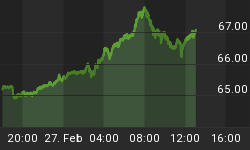I'm don't know whether it makes sense to read a lot into Monday's action itself. Volumes were light; presumably, this is mainly because many investors are waiting to see what the second meeting of EU leaders later this week produces.
German Chancellor Merkel is reportedly going to seek parliamentary approval to apply leverage to the EFSF. If she succeeds, and some sort of bank-and-sovereign-backstop package gets approved, it is likely bullish for stocks - but even reaching agreement on anything remains a big 'if.' I would also point out that all such an agreement would do is to kick the problem down the road, for a year or less. Also contained in the article linked to above is the observation that the EU wants Greek debt haircut by 60%, while banks think it should be 40%. I find it remarkable, and telling, that no one seems to be asking wha t number actually makes the Greek situation tenable. Still, 50% would be closer to the right number than 21%, which is what the last deal was.
Stocks rallied again, and are up 14.1% over the last three weeks. For those playing along at home, that's a 244% annualized rate of gain. Is it notable that volume has returned to the standard that prevailed prior to August - sub 1 billion NYSE shares? Surely it is worth observing that while 10-year Treasury yields sold off from 1.76% to 2.20% from October 1st through 12th, they essentially have not risen further since then. Stocks and bonds have uncoupled as bond investors remain somewhat skeptical that all is well.
Is there reason to be optimistic? There's always some reason to be optimistic, just like there's always some reason to be pessimistic (that's what makes markets, after all). On the optimistic side, let me introduce the rebound in copper, which soared 6.5% today after having reached a 15-month low last week. Front Copper is now 12.8% above those lows. That's good news, because as you can see from the chart below, while Copper and stocks have moved in lock-step for the last three years, equities have recently been making Doc Copper look somewhat tarnished. (Incidentally, in my view the very fact that copper parallels stocks diminishes the value of that metal's economics degree. Because we certainly know that stocks do not echo every wiggle of industrial production!)
Of course, the flip side of that same coin is the fact that stocks have been leaping ahead of industrial metals, showing more optimism than commodities buyers are showing. Moreover, higher industrial prices and energy prices can be both symptom of growth...and a cure for it! NYMEX Crude reached nearly three-month highs today, above $91/bbl. This may be related to the passing of the Saudi crown prince over the weekend as well as the revelation that the post-Gadhaffi government in Libya seems to be shaping up to be more Islamist rather than less so. And as these things both make the Middle East marginally less stable (although presumably the succession question in Saudi Arabia will be settled peacefully) at the same time that the U.S. Administration has decided to withdraw all troops from Iraq before they are kicked out, it is perhaps reasonable to put a small additional risk premium into petroleum prices. Interestingly, while commodities had quite a good day, inflation sw aps barely moved.
As I said in the beginning of this comment, I'm not sure I want to read deep implications into the modest breakdown in correlations we are finally seeing - stocks up, but volatility still high (VIX around 29); commodities up, inflation swaps unchanged; equities rally but bonds stable. I suspect that we will need to get the results (or lack thereof) from the EU meeting before the meaningful money flows arrive.
Tomorrow's data includes October Consumer Confidence (Consensus: 46.0 from 45.4), in the first look at October data. The story from September was that the data, which had been weakening since February or March, stopped getting worse. Now, remember that Consumer Confidence isn't on a 0-100 scale. A reading of 46.0 is horrible - such a level was not recorded in any of the last three recessions prior to the 2008 crunch (see Chart below).

The current level of confidence is incredibly weak - and it's hard to keep it this weak for long.
It is hard to sustain such negative levels of sentiment for a long period of time in a country that has historically had an optimistic citizenry. It would not surprise me to see some recovery, even though I don't believe an economic resurgence is imminent.
Although it is tempting to get aboard the stock market for a late-year rally, it would be foolhardy to do that before seeing resolution from Europe. I've said for a while that stocks would rally once Greece actually announced default; the 14% rally makes the upside of that trade less likely but I really don't think we'll see anything like a true default yet. High implied volatilities and low bond yields continue to signal that there is more risk out there than equity investors perceive. I am making no major changes to my allocation at the moment.















